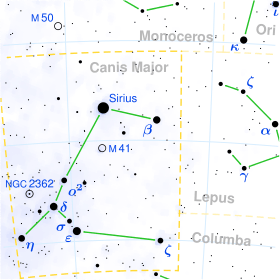Iota Canis Majoris

| |
| Observation data Epoch J2000 Equinox J2000 | |
|---|---|
| Constellation | Canis Major |
| Right ascension | 06h 56m 08.22413s[1] |
| Declination | −17° 03′ 15.2675″[1] |
| Apparent magnitude (V) | 4.40[2] (4.36 - 4.40[3]) |
| Characteristics | |
| Spectral type | B3 Ib[4] |
| U−B color index | −0.74[5] |
| B−V color index | −0.07[5] |
| Variable type | Beta Cephei?[2] |
| Astrometry | |
| Radial velocity (Rv) | +41.20[6] km/s |
| Proper motion (μ) | RA: −3.56 ± 0.17[1] mas/yr Dec.: +2.42 ±0.20[1] mas/yr |
| Parallax (π) | 1.04 ± 0.20[1] mas |
| Distance | approx. 3,100 ly (approx. 1,000 pc) |
| Absolute magnitude (MV) | −5.51[7] |
| Details | |
| Mass | 12.5[8] M☉ |
| Radius | 25.9[7] R☉ |
| Luminosity | 47,000[7] L☉ |
| Surface gravity (log g) | 2.60[9] cgs |
| Temperature | 17,000[9] K |
| Metallicity [Fe/H] | −0.17[10] dex |
| Rotational velocity (v sin i) | 27 ± 4[9] km/s |
| Age | 14.8[8] Myr |
| Other designations | |
| Database references | |
| SIMBAD | data |
Iota Canis Majoris (ι Canis Majoris, ι CMa) is a variable supergiant star in the constellation Canis Major.
Iota Canis Majoris is a blue-white B-type supergiant with an apparent magnitude that varies between +4.36 and +4.40.[3] It has been classified as a Beta Cephei type variable star,[3] but the supergiant spectral type and a period of over a month mean it is no longer considered to be of that type.[2] It is approximately 3100 light years from Earth. This star has 24.9 times the radius of the Sun.
References
- 1 2 3 4 5 van Leeuwen, F. (November 2007), "Validation of the new Hipparcos reduction", Astronomy and Astrophysics, 474 (2): 653–664, arXiv:0708.1752
 , Bibcode:2007A&A...474..653V, doi:10.1051/0004-6361:20078357
, Bibcode:2007A&A...474..653V, doi:10.1051/0004-6361:20078357 - 1 2 3 Stankov, Anamarija; Handler, Gerald (2005). "Catalog of Galactic β Cephei Stars". The Astrophysical Journal Supplement Series. 158 (2): 193–216. arXiv:astro-ph/0506495
 . Bibcode:2005ApJS..158..193S. doi:10.1086/429408. ISSN 0067-0049.
. Bibcode:2005ApJS..158..193S. doi:10.1086/429408. ISSN 0067-0049. - 1 2 3 Samus, N. N.; Durlevich, O. V.; et al. (2009). "VizieR Online Data Catalog: General Catalogue of Variable Stars (Samus+ 2007-2013)". VizieR On-line Data Catalog: B/gcvs. Originally published in: 2009yCat....102025S. 1: 02025. Bibcode:2009yCat....102025S.
- ↑ Prinja, R. K.; Massa, D. L. (2010). "Signature of wide-spread clumping in B supergiant winds". Astronomy and Astrophysics. 521: L55. arXiv:1007.2744
 . Bibcode:2010A&A...521L..55P. doi:10.1051/0004-6361/201015252. ISSN 0004-6361.
. Bibcode:2010A&A...521L..55P. doi:10.1051/0004-6361/201015252. ISSN 0004-6361. - 1 2 Mermilliod, J.-C. (1986). "Compilation of Eggen's UBV data, transformed to UBV (unpublished)". Catalogue of Eggen's UBV data. Bibcode:1986EgUBV........0M.
- ↑ Gontcharov, G. A. (2006). "Pulkovo Compilation of Radial Velocities for 35 495 Hipparcos stars in a common system". Astronomy Letters. 32 (11): 759–771. Bibcode:2006AstL...32..759G. doi:10.1134/S1063773706110065. ISSN 1063-7737.
- 1 2 3 Balona, L. A.; Engelbrecht, C. A. (1985). "Photometry and frequency analysis of line profile variables". Monthly Notices of the Royal Astronomical Society. 214 (4): 559. Bibcode:1985MNRAS.214..559B. doi:10.1093/mnras/214.4.559.
- 1 2 Tetzlaff, N.; Neuhäuser, R.; Hohle, M. M. (2011). "A catalogue of young runaway Hipparcos stars within 3 kpc from the Sun". Monthly Notices of the Royal Astronomical Society. 410: 190. Bibcode:2011MNRAS.410..190T. doi:10.1111/j.1365-2966.2010.17434.x.
- 1 2 3 Lefever, K.; Puls, J.; Morel, T.; Aerts, C.; Decin, L.; Briquet, M. (2010). "Spectroscopic determination of the fundamental parameters of 66 B-type stars in the field-of-view of the CoRoT satellite". Astronomy and Astrophysics. 515: A74. arXiv:0910.2851
 . Bibcode:2010A&A...515A..74L. doi:10.1051/0004-6361/200911956.
. Bibcode:2010A&A...515A..74L. doi:10.1051/0004-6361/200911956. - ↑ Gies, Douglas R.; Lambert, David L. (1992). "Carbon, nitrogen, and oxygen abundances in early B-type stars". Astrophysical Journal. 387: 673. Bibcode:1992ApJ...387..673G. doi:10.1086/171116.
This article is issued from Wikipedia - version of the 12/1/2016. The text is available under the Creative Commons Attribution/Share Alike but additional terms may apply for the media files.